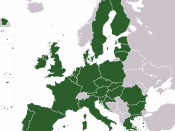Hungary is a relatively new member of the worldwide economy. Like many of its neighbors in Central and Eastern Europe, Hungary is a transition country, changing from a communist society to a free market economy in 1991. Transition occurred smoothly and quickly, and Hungary was one of the region's early standout performers. From the beginning of transition, the government understood that privatization and foreign investment were essential to the country's success in the world economy and worked to attract investment to Hungary.
The Hungarian Secretary of State has called Hungary "an investor's heaven," and the large amounts of foreign direct investment that have poured into the country since the early 1990s helps validate this claim. Many large U.S. and European companies have facilities in Hungary. The country offers a central location to take advantage of trade movements, a legal environment welcoming to investors, incentives for investment, and a skilled and educated workforce.
Additionally, acceptance into the European Union in 2004 gives Hungary even more investor appeal. The drive for membership provided increased momentum for institutional reform in the country. Though further reform, and time, is needed to meet all criteria for euro adoption, EU membership lends stability to the country. Enhanced trade and access to new markets and consumers are additional benefits for Hungary.
Despite success during transition and EU membership, Hungary has recently struggled, notably on the political and economic fronts, causing growth to slow considerably. Years of fiscal slippage by governments aiming to fulfill campaign promises, combined with already generous social services, created a twin deficits problem for Hungary. The current government, led by Prime Minister Ferenc Gyurcsány, implemented a fiscal policy package of severe austerity measures designed to reign in debt and get the country back on track for euro adoption. Though the deficits are decreasing,


